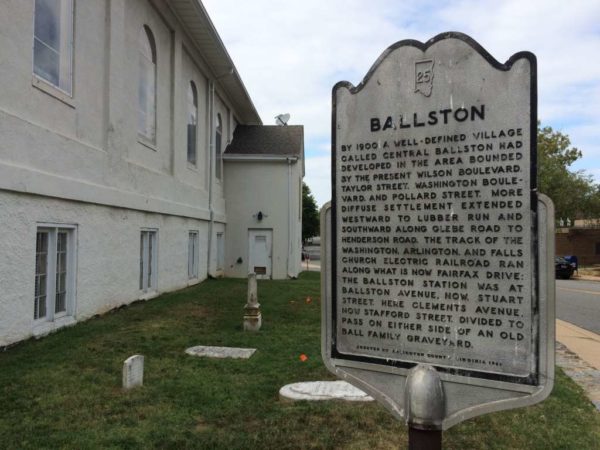Members of the Ball family, for which Ballston is named, would like to see their small family graveyard along Fairfax Drive preserved and not moved for a redevelopment.
An attorney representing four descendants of Robert Ball Sr. sent a letter (below) stating the family members’ position to the Arlington County Board earlier this week.
The family members “fully support” an item on this Saturday’s County Board agenda that would be a first step to designating the graveyard a local historic district, according to the letter .
The attorney, Alexander Berger, said family members do not want to prevent the planned redevelopment of the church, but they do want the church to honor its century-old commitment — made after the family granted the church the land on which it sits — to preserve the graveyard.
“This is a situation where everyone involved can certainly find agreement,” Berger said. The family members have “no desire to stand in the way of the church and the development, provided they honor the history of the county and the family.”
The church, meanwhile, is pursuing two different methods of trying to get approval to move the graveyard. First, it has applied for a permit with the Virginia Dept. of Historic Resources. Additionally, it has filed suit against members of the Ball family in Arlington Circuit Court in order to have the graveyard declared abandoned, which would then allow it to be moved.
“It is not a lawsuit in the sense anybody is suing anybody,” explained Tad Lunger, the attorney for the church. “There are basically two ways to allow for the relocation of human remains in Virginia, the first being through the DHR permit process, and the second being to get a court order to allow the relocations to occur.”
“The DHR permit is more of a passive notice process, whereas for the court process we cast a wider net and actually have to do genealogical research to locate any potential descendants and proactively go out and notify them,” Lunger continued. “Because we wanted as much opportunity for descendants to know we might find human remains at this site, and we wanted to know directly from them what they felt was most appropriate to do with any remains if they were found, we decided to do both processes to get as much involvement as possible.”
Berger, who was hired by family members after they were served with the lawsuit, said that the church “didn’t go about this in the right way.”
Berger said he believes the church is working on a plan for building the new development around the graveyard, which family members would likely support, but those plans have not yet been shared with him or the family.


